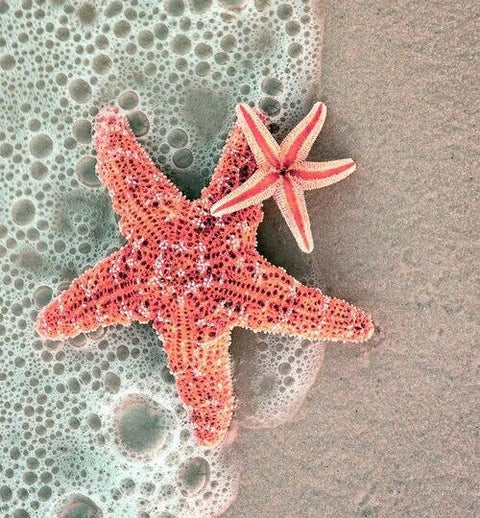The sea
It is no coincidence that after spending a day at sea, we feel much better. On an external level, sea water has a very beneficial effect on our health: it helps combat respiratory problems, cures skin diseases such as psoriasis and heals wounds, soothes pain from rheumatism, osteoarthritis and arthritis, reduces stress and anxiety.
Although there is a popular belief that seawater is not suitable for consumption, drinking it has enormous benefits for our health. This liquid contains minerals, proteins, vitamins and more than 90 elements of the periodic table that are essential for our body, which helps us lead a healthy life, rich in nutrients and minerals, and most importantly, in a natural way.
But...What is "Sea Water"?
The marine world is the most important ecosystem on Earth: its waters have been creating life for millennia. We ourselves come from a single-celled marine organism.
It contains the elixir of the origins of life, and its consumption nourishes our body in an excellent way. Seawater is a source of mineral resources in which, with greater or lesser concentration, all the elements of the periodic table necessary for our body are found.
And it is not that drinking sea water is just a fad: there are references from before Christ about therapists who used sea water as a healing source for different illnesses.
Sea water is a solution made up of water and salts, in a proportion of 96.5% water and 3.5% salts. Learn about the different types that exist for consumption and the benefits it can bring to our body.

Composition of Sea Water
The salts that make up sea water are made up of:
Chemical compounds, such as chlorine, sodium, magnesium, calcium, potassium, bromine, strontium, boron and fluorine mainly.
Trace elements in infinitesimal concentrations such as: iron, manganese, copper, iodine, silicon, phosphorus…
Presence of zooplankton and phytoplankton .
It contains around 83 bioavailable elements out of the 118 elements of the periodic table. The presence of these elements makes seawater a good resource for making up for mineral deficiencies or complementing the mineral intake from the normal diet.
Since ancient times, humans have learned to use water as a healing element through hydrotherapy techniques.
We owe our knowledge of seawater therapy to the French scientist René Quinton (1867-1925), who demonstrated the similarity of the composition of blood plasma to that of seawater. He established that human cells can stay alive in this primitive seawater, which is less salty than today. So, by diluting seawater to lower the concentration of salts and bringing it closer to that of blood, he obtained marine plasma with which he cured thousands of people, at a time when there were no antibiotics.

Health Benefits
It provides the body with the minerals and trace elements it needs for proper functioning.
Relieves the symptoms of rhinitis, sinusitis and other respiratory diseases.
Mucolytic, dissolves mucus and hydrates mucous membranes.
Accelerates wound healing.
Its magnesium content helps reduce stress and anxiety.
Reduces fatigue and accelerates muscle recovery.
It can be used as a mouthwash, disinfectant and healing agent for mouth infections.
It is a natural laxative, it stimulates peristaltic movements and intestinal emptying.
Improves the flavour of food. Replacing common salt with seawater in cooking allows you to obtain more natural and original flavours full of nuances and without masking.
Antioxidant, slows down cellular aging.

Types of "Sea Water"
It is clear that when we talk about sea water we are not referring to drinking water, because its salinity is four times higher than ours. This makes it incompatible with our internal environment, especially if we intend to drink it as we do with fresh water.
However, we must not forget that the dose is what distinguishes a poison from a remedy. In the market we can find different presentations:
Isotonic Sea Water
The isotonic drink is obtained by mixing sea water with mineral water with the same concentration of organic salinity. It has an approximate concentration of 9 grams of salts per litre of water, which is similar to that of the liquids in the human body (plasma, tears, sweat…), and is ready to drink, either in its natural form or in formats with different citrus aromas.
You should try to drink it in small, spaced-out glasses to prevent the accumulation of salt in the intestine from having a laxative effect. It has the function of naturally remineralizing and rehydrating the body.
Hypertonic Sea Water
It is 100% sea water without altering its composition and concentration of mineral salts. It is called hypertonic because it has a higher saline concentration than ours, specifically four times ours with 36 grams of salts per liter of water. When taken in large quantities it usually acts as a laxative. The ideal is in the morning on an empty stomach. In these cases it acts as a purgative of the system and hardly any minerals are retained.

How to take "Sea Water"
Dilute sea water with fresh water in a ratio of 1 to 3: one part salt water to three parts fresh water, or use natural citrus juice or an infusion to give it a more pleasant taste. Ideally, take it in different sips throughout the day, so that your body can gradually absorb the mineral properties.
We recommend following your GP's guidelines to confirm any contraindications.
How much to drink
As a restorative for the body, between 30 and 50 ml per day is sufficient, with the maximum tolerated limit being 500 ml.
Contraindications of sea water
There are no contraindications to drinking sea water as long as you do not suffer from any disease in which salt intake is counterproductive. However, you should take a number of precautions before you start consuming it:
Test that you are not intolerant to sea water by taking small amounts to verify that it feels good.
Calculate the amount and frequency of drinking, as some people are more prone than others to have diarrhea when drinking seawater.
Mix with juices or with normal water and a few drops of lemon or lime. This is a good way to avoid spoiling the characteristic taste of water.
You can also use it….
For cooking, replacing common salt, or also for preserving and defrosting fish and seafood.
In the health and hygiene of our body to relieve nasal irritations, heal small wounds, as a mouthwash or antiseptic.
It can also be diluted and used as an isotonic drink or in other concentrations so that it can be drunk.
There are currently several brands that sell seawater in different formats, such as dosed ampoules to be taken as a supplement or to be diluted in other liquids, in bottles or larger containers, which are always better to choose from glass.

https://www.sportlife.es/vida-sana/estos-son-los-beneficios-de-utilizar-agua-de-mar-nzm_204576_102.html
https://www.sabervivirtv.com/medicina-general/descubre-aprovecha-beneficios-agua-mar-salud_3536
https://www.salud.mapfre.es/cuerpo-y-mente/habitos-saludables/propiedades-beneficios-agua-mar/
https://solnatural.bio/recipe/agua-de-mar-desintoxica-oxigena-alcaliniza-y-nutre-tu-organismo




Comments (0)
There are no comments for this article. Be the first one to leave a message!